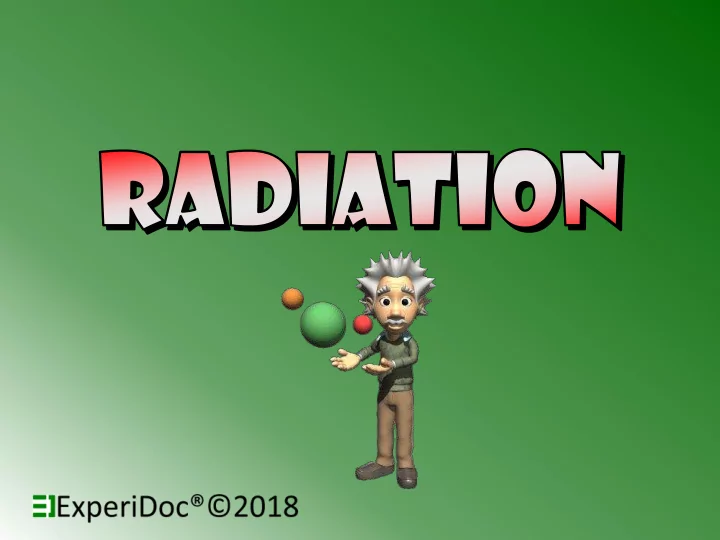

RADIATION • There are three (3) primary categories of radiation that might be encountered in a field survey • Alpha • Beta • Gamma
RADIATION • Alpha • Energetic helium ions • (atoms that have lost their electrons) • Large size (compared to other forms of radiation) • High charge • Will not penetrate through much matter
RADIATION • Beta • Small size • Will penetrate through more material than alphas • Generally can be stopped by a thin piece of metal
RADIATION • Gamma • High energy light • The most penetrating of the radiation types • Very high energy gammas can penetrate through several centimeters of lead
Definitions • Roentgen • The unit of measure for X or gamma radiation in air. • Rad • The unit of measure for radiation energy transferred to an absorbing tissue. • Rem • The unit of measure which represents the risk associated with the radiation exposure.
Definitions • TLD: • Thermoluminescent Dosimeter • A device to measure Beta and Gamma exposure. Ring dosimeter Badge dosimeter
Definitions • Gieger-Mueller Counter : • A device to measure Beta and Gamma exposure.
Definitions • Curie: • 2,200,000,000,000 (2.2x10 12 ) • Disintegrations per minute (dpm) • CPM: • Counts Per Minute • (Also known as the amount of disintegrations per minute (dpm))
Definitions • Inverse Square: 2 IP = I I ( ) d I d 2
10 Ci A r A radioact oactive ive sou ource ce wi with an n activit vity y of of 1 Ci (micr croCuri oCuries) es) has a h half-li life fe of of 1 100 0 days s and nd gi gives es a rea eadi ding ng of of 100 millirem rems s per er hou our (mrem em/hr) /hr) at 4 met eters ers on on a Gei eige ger-Muell ueller er cou ounter. nter. What dose rate would you receive if you were 2 meters from the source?
10 Ci A r A radioact oactive ive sou ource ce wi with an n activit vity y of of 1 Ci (micr croCuri oCuries) es) has a h half-li life fe of of 1 100 0 days s and nd gi gives es a rea eadi ding ng of of 100 millirem rems s per er hou our (mrem em/hr) /hr) at 4 met eters ers on on a Gei eige ger-Muell ueller er cou ounter. nter. What dose rate would you receive if you were 2 meters from the source?
10 Ci A r A radioact oactive ive sou ource ce wi with an n activit vity y of of 1 Ci (micr croCuri oCuries) es) has a h half-li life fe of of 1 100 0 days s and nd gi gives es a rea eadi ding ng of of 100 millirem rems s per er hou our (mrem em/hr) /hr) at 4 met eters ers on on a Gei eige ger-Muell ueller er cou ount nter. er. What is the activity of the source after 100 days?
ALARA Always Lie About Radiation Accidents
Maintain Exposure ALARA As Low As Reasonably Achievable
Radiation Exposure • One of four things may happen when radiation strikes a cell: 1. The radiation may pass through the cell without doing any damage
Radiation Exposure • One of four things may happen when radiation strikes a cell: 2. The cell may be damaged but repairs itself
Radiation Exposure • One of four things may happen when radiation strikes a cell: 3. The cell may be damaged so that it not only fails to repair itself, but reproduces in damaged form over a period of years • Incompletely or imperfectly repaired cells can lead to: • Delayed health effects • Cancer genetic mutations • Birth defects
Radiation Exposure • One of four things may happen when radiation strikes a cell: 4. The cell may be killed • Problems will occur if so many cells are killed that the body cannot properly function
Chronic Exposure Risk • A normal U.S. citizen has a 25% risk of cancer. • 1 Rem increases risk to 25.03% • 100 Rem increases risk to 28%.
Background Radiation • Unavoidable • Comes from cosmic sources & earth materials • Averages .01 - .02 mR/hr gamma in the USA
Exposure Limits • U.S. EPA Action Level: • 1 mR/hr gamma above background • OSHA • 5 REM/year • NRC • 5 REM/year
Exposure Reduction Mechanisms • TIME • DISTANCE • SHIELDING
Summary • There are three (3) primary • Inverse Square categories of radiation • ALARA • Alpha • Radiation Exposure • Beta • Background Radiation • Gamma • EPA Levels • Definitions • OSHA Levels • Roentgen • Exposure Reduction • Rad Mechanisms • Rem • TIME • TLD • DISTANCE • Curie • SHIELDING
Recommend
More recommend